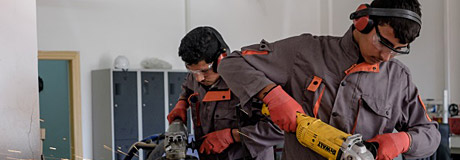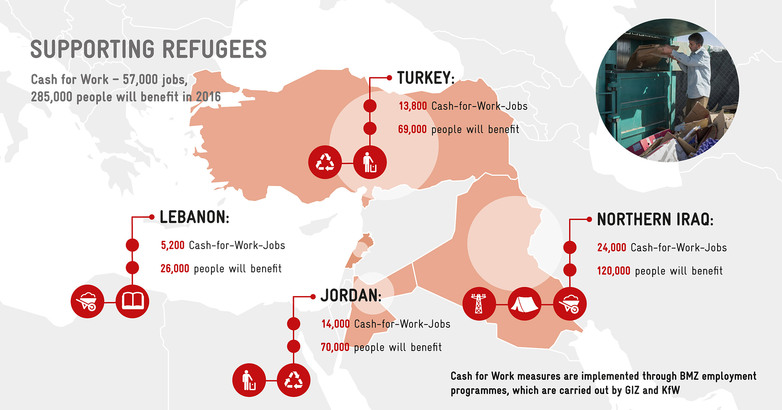
Cash for Work and training schemes are creating prospects in northern Iraq
21.12.2016 – GIZ is supporting people who have fled Syria and are internally displaced in Iraq in rebuilding an independent life.
Since early November 2016, 15 young men have been learning to use welding equipment at the Jiner vocational training centre in northern Iraq. Most of the group are Syrians now living in Dohuk province as refugees. Others are Yazidis who fled the Sinjar mountain region to escape the advance of the so-called ‘Islamic State’. The groups have one thing in common: they are now living in camps and, after all they have experienced, they want to live an independent life and earn their own living with prospects for the future.
More than one million internally displaced persons and around 250,000 Syrian refugees have sought refuge in northern Iraq since the end of 2014. Working on behalf of the German Federal Ministry for Economic Cooperation and Development (BMZ), the Deutsche Gesellschaft für Internationale Zusammenarbeit (GIZ) GmbH is supporting the autonomous Kurdish region in enabling these people lead independent lives. GIZ is combining rapid short-term assistance with medium- and long-term structural projects. All its measures also benefit the local population.

Working with the Jiner vocational training centre, GIZ is providing 15 training courses. Between November 2016 and March 2017, 300 young people will acquire vocational skills in occupations including basic plumbing, electrical work and welding or train as a confectioner or PC technician. The courses are run solely in occupations for which there is demand on the labour market, so that the participants will be able to earn an independent living once they have completed their training.
Alongside these longer-term training initiatives, GIZ has been focusing in 2016 on projects in northern Iraq that provide rapid and direct benefit to individuals. Cash for Work programmes enable internally displaced persons, Syrian refugees and the population in host communities to earn money for a short period and cover their own basic needs. There are many different ways of earning the cash: participants in the programme are building roads, upgrading schools and maintaining sewers and drains. For the participants, the work is often a welcome relief from enforced passivity. Depending on the skills involved, participants earn between EUR 20 and EUR 30 a day and receive the money in cash at the end of the working day. By the end of the year, BMZ employment programmes will have benefitted 57.000 people in Iraq, Turkey, Lebanon and Jordan – 39.000 of them through projects provided by GIZ.